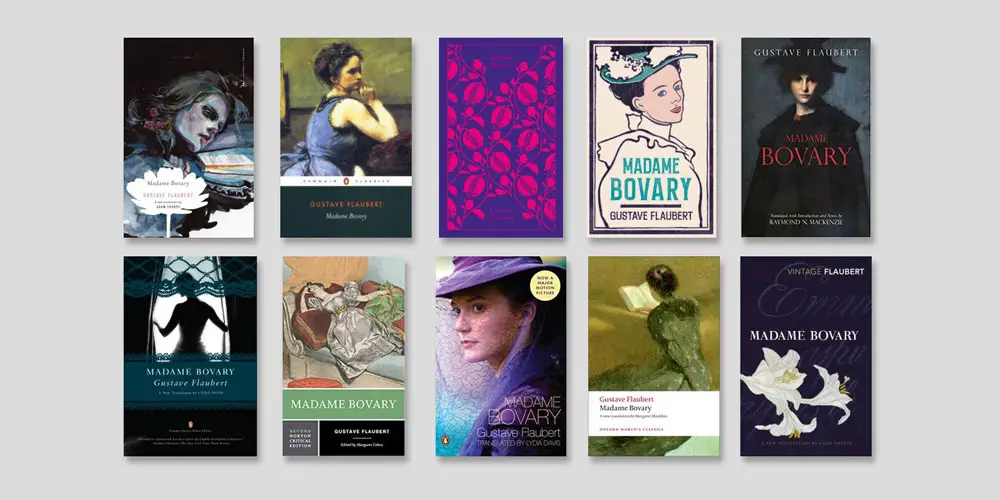“Which English translation of Madame Bovary should I read?”
I found so much information on translations of Madame Bovary that I had to split this post into two. Part 1 of this post talks about the history of the novel and the challenges of translating it, and gives information about 11 translations published from 1886 to 1965.
This page is Part 2. It focuses on 7 translations published from 1992 to 2011 and gives information about a few related books for further reading.
TLDR?
If you just want a quick-and-dirty recommendation on which translation to choose, jump to the conclusion at the bottom of this page.
Madame Bovary: Translations in English
The original Marx translation, published thirty years after the French version, is available in original and edited form. Nine others are currently in print too.
Described in Part 1 (separate page)
- 1886 – Eleanor Marx-Aveling
- 1902 – W. Blaydes
- 1905 – Henry Blanchamp (abridged)
- 1928 – J. Lewis May
- 1948 – Gerard Hopkins (Oxford)
- 1949 – Joan Charles
- 1950 – Alan Russell (Penguin)
- 1957 – Francis Steegmuller (Everyman/Vintage)
- 1959 – Lowell Bair (Bantam)
- 1964 – Mildred Marmur (Signet)
- 1965 – Marx-Aveling edited by Paul de Man (Norton)
Described Below (on this page)
- 1992 – Geoffrey Wall (Penguin)
- 2004 – Margaret Mauldon (Oxford)
- 2005 – Marx-Aveling edited by Paul de Man and Margaret Cohen (Norton)
- 2009 – Raymond N. MacKenzie (Hackett)
- 2010 – Christopher Moncrieff (Alma)
- 2010 – Lydia Davis (Penguin)
- 2011 – Adam Thorpe (Vintage/Modern Library)
Madame Bovary: Translation Comparison
Extracts have been included below so that you can see how the different translations sound.
Madame Bovary: Other Info and Resources
For a list of online guides and books about or inspired by Madame Bovary, jump down the page.
Who is Geoffrey Wall?
He is a professor of French, a translator, and a writer of literary biography, travel writing, journal articles, magazine articles, and news articles. He has produced translations of several of Flaubert’s works. His volume of selected letters and biography of Flaubert are now out of print.
About the Wall translation of Madame Bovary
The Oxford Guide to Literature in English Translation edited by Peter France
This translation “seeks to reproduce some of the formal features of Flaubert’s text, notably his punctuation and paragraphing. This ‘foreignizing’ version has real merits, but Wall is not always so careful with the meaning of the original and his version often sounds unnecessarily awkward.”
The London Review of Books: “Writer’s Writer and Writer’s Writer’s Writer” by Julian Barnes
After a long discussion of the ins and outs of translation, and of the recent Davis translation, Barnes says: “[F]or a tighter [translation], go to Wall.”
“Flaubert’s Voice: Retranslating Madame Bovary” by Geoffrey Wall
Wall referred to translations by Marx-Aveling, Hopkins, and Russell while preparing his own. “[My] translation of Madame Bovary was driven by an amorous imaginative fascination for the little details, for the textures, the shapes, the sentence-by-sentence immediacy of Flaubert’s writing. That is what held me, kept me going, as a translator. That writing has entangled me, induced me to spend half a life-time playing with Flaubert. Playing with his words, as his translator. Playing with the events of his life, as his biographer. Sustained by the impossible desire to be Flaubert, to voice his words once again, in my own voice…. Joycean English seemed to me the perfect medium in which to capture and convey the insidious pleasures of free indirect style.”
Extract from the Wall translation of Madame Bovary
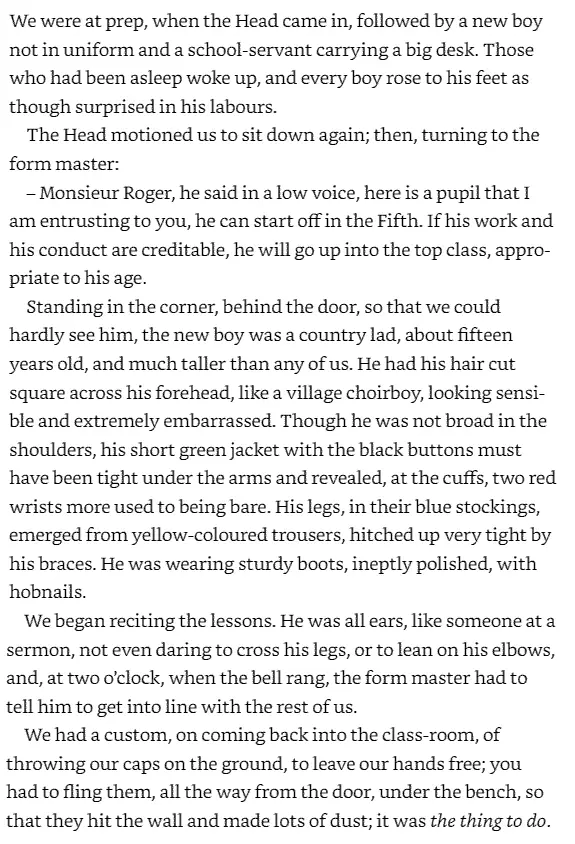

Get the Penguin Clothbound Classics Wall translation of Madame Bovary: Provincial Lives
Includes an introduction by Geoffrey Wall and a preface by Michele Roberts. Cover design by Coralie Bickford-Smith.
Available as a hardcover (ISBN 9780141394671, 384 pages).

Get the Penguin Classics Wall translation of Madame Bovary: Provincial Lives
Includes an introduction and notes by Geoffrey Wall and a preface by Michele Roberts.
Available as a paperback (ISBN 9780140449129, 384 pages).
Who is Margaret Mauldon?
She is an Argentinian/British translator.
About the Mauldon translation of Madame Bovary
The Atlantic: “No Way, Madame Bovary” by Clive James
This rather snide and snobby review says this edition “bears on its cover James Tissot’s Young Woman in a Boat, dating from 1870…. But Madame Bovary was first published in 1857…. [A] pedant might wish that a French painter of a slightly earlier period could have been called in; but the young lady certainly has a sensual mouth, which can be said to fit. Already, though, it is hard to suppress a suspicion that in the matter of historical fidelity things are out of kilter, and the suspicion intensifies once the book is opened.” James cites the example of Rodolphe exclaiming “No way!” instead of “No, No, a thousand times no!”. “[R]ecent translations tend to be busywork, and earlier ones tend to be the real tributes, even when inaccurate by scholarly standards. No doubt this new translation of Madame Bovary is a labor of love. But affection and affectation don’t sit well together.”
New York Review of Books: “Flaubert, Imperfect” by Jonathan Raban
“Flaubert, for all his claims to objectivity, never sheds the mantle of an haut bourgeois writing, for the most part, about members of the petite bourgeoisie. Class fascinated him, and Madame Bovary is full of minute distinctions on matters of rank, status, and class usage (distinctions to which American translators, notably Margaret Mauldon, whose translation is otherwise graceful and sensitive, have sometimes been jarringly deaf).”
Extract from the Mauldon translation of Madame Bovary
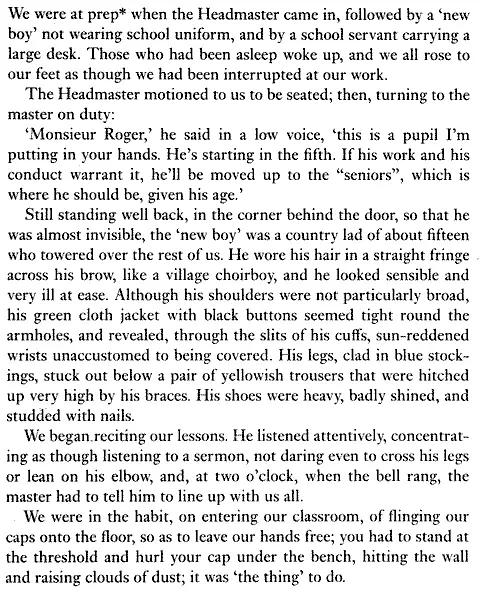

Get the Oxford World's Classics Mauldon translation of Madame Bovary: Provincial Manners
Includes an introduction by Malcolm Bowie and notes by Mark Overstall.
Available as a paperback (ISBN 9780199535651, 368 pages).

Get the Oxford World's Classics Mauldon translation of Madame Bovary: Provincial Manners
Includes an introduction by Malcolm Bowie and notes by Mark Overstall.
Available as an ebook.
Who is Margaret Cohen?
“Margaret Cohen is Andrew B. Hammond Professor of French Language, Literature and Civilization, Professor of Comparative Literature and English and Professor by courtesy of French and Italian at Stanford University, USA. Her most recent book is The Novel and the Sea (2010), which was awarded the Louis R. Gottschalk Prize from the American Society for Eighteenth-Century Studies and the George and Barbara Perkins Prize from the International Society for the Study of the Narrative.”
About the Marx-Aveling/de Man/Cohen translation of Madame Bovary
This is a revised version of the 1965 Norton edition.
Extract from the Marx-Aveling/de Man/Cohen translation of Madame Bovary
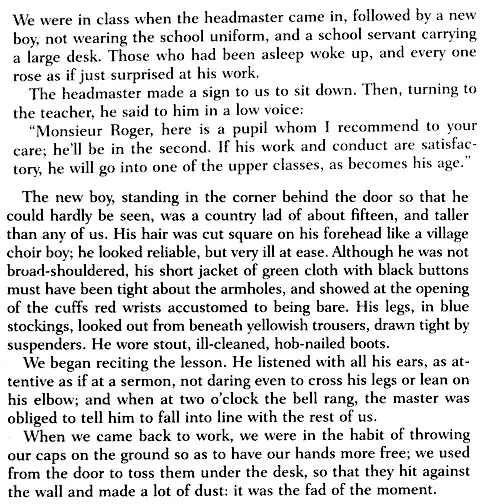
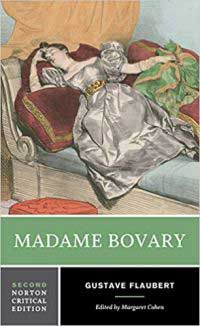
Get the Norton Critical Editions Marx-Aveling/de Man/Cohen translation of Madame Bovary
This is the 2nd Norton edition. It contains the Marx-Aveling translation revised by Paul De Man, subsequently revised by Margaret Cohen. This edition has a new introduction and annotations, and twenty-one images. This Norton edition is the only one available that includes the complete manuscript from Flaubert’s 1857 trial. It also includes a translator's note, sixteen critical essays, twelve of them new to the Second Edition, and a chronology and selected bibliography.
Available as a paperback (ISBN 9780393979176, 576 pages).
Who is Raymond N. MacKenzie?
He is a translator of works in French and a professor of English specializing in Milton, 19th- and 20th-century British literature, literary criticism, and modern French literature.
Extract from the MacKenzie translation of Madame Bovary
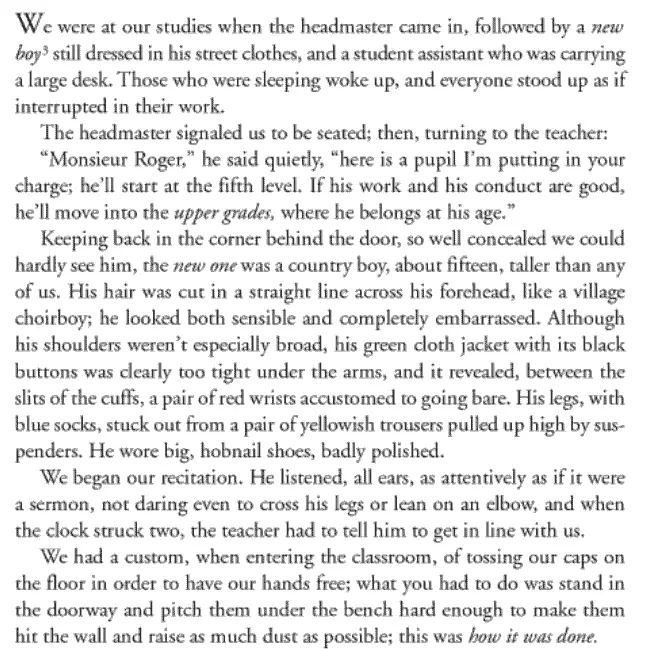
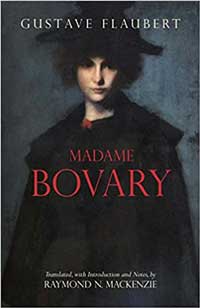
Get the Hackett Classics MacKenzie translation of Madame Bovary: Provincial Lives
Includes footnotes, a bibliography and a chronology
Available as a paperback (ISBN 9781603841238, 346 pages).
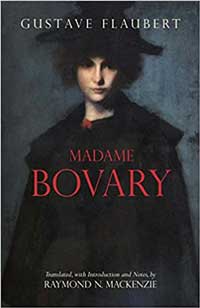
Get the Hackett Classics MacKenzie translation of Madame Bovary: Provincial Lives
Includes footnotes, a bibliography and a chronology
Available as a hardcover (ISBN 9781603841245, 346 pages).
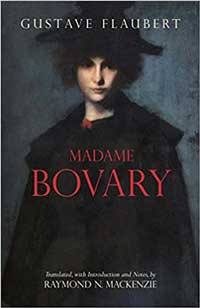
Get the Hackett Classics MacKenzie translation of Madame Bovary: Provincial Lives
Includes footnotes, a bibliography and a chronology
Available as an ebook.
Who is Christopher Moncrieff?
He is a poet and a translator of French, German, and Romanian literature.
Extract from the Moncrieff translation of Madame Bovary
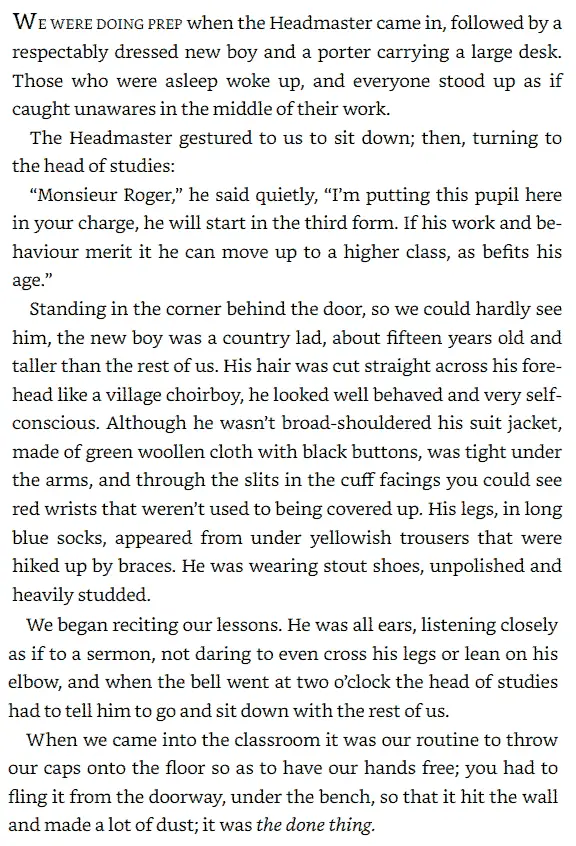
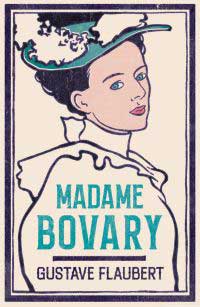
Get the Alma Classics Evergreens Moncrieff translation of Madame Bovary
Includes a note on the text, notes, an author bio, a list of works, a list of adaptations, and a bibliography.
Available as a paperback (ISBN 9781847493224, 352 pages).
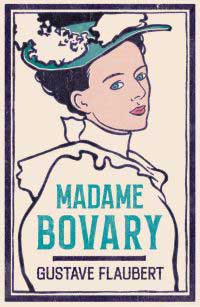
Get the Alma Classics Evergreens Moncrieff translation of Madame Bovary
Includes a note on the text, notes, an author bio, a list of works, a list of adaptations, and a bibliography.
Available as an ebook.
Who is Lydia Davis?
An award-winning American novelist, translator, and writer of ultra-short stories. She translated Swann’s Way, the first volume of Marcel Proust’s In Search of Lost Time aka Remembrance of Things Past.
About the Davis translation of Madame Bovary
The London Review of Books: “Writer’s Writer and Writer’s Writer’s Writer” by Julian Barnes
“The root feature of Davis’s translation is a close attention to Flaubert’s grammar and sentence structure, and an attempt to mirror it in English…. Davis’s Madame Bovary is a linguistically careful version, in the modern style, rendered into an unobtrusively American English. At its best, it conveys the precision – which some think dryness – of Flaubert’s prose in this novel, while its syntactical mirroring of the French sometimes brings us closer to Flaubert. At its worst, it takes us too far away from English, and makes us less aware of Flaubert’s prose than of Davis being aware of Flaubert’s prose. And such defects come from something very old-fashioned: a lack of love for the work being translated.”
The New Yorker: “What I Read This Year” by James Wood
“Davis got lots of attention, but rarely of the right kind, because her translation was too often reflexively praised by people who were not familiar with Flaubert’s French, or wanly criticized (see Julian Barnes in the London Review of Books) by people who have possessive agendas…. I consistently admired Davis’s attempts to get as close as possible to a quality of hardness, or coldness, in Flaubert’s own prose…. Flaubert’s strict, elegant, rhythmic sentences come alive in Davis’s English. She does not flinch.”
New York Review of Books: “Flaubert, Imperfect” by Jonathan Raban
“Should love for the work in hand be a necessary qualification for translating it? Like surgery, translation requires judgment, precision, and experience; the surgeon’s personal affection for the patient is likely to be as much a liability as an asset…. In her own work, she’s concerned with the smallest tonal effects of language, at the level of the word, the phrase, and the sentence, and this absorption in verbal and grammatical minutiae carries through into her translations. She has a finer ear for the natural cadences of English, in narrative and dialogue, than any of her predecessors, and there are many moments in her Madame Bovary when one pauses to admire how clean and spare a sentence seems by comparison with its earlier translated versions. But she can be a pedant, and nowhere more so than in her scolding insistence on the importance of the imparfait tense in Flaubert’s original…. [her translation] uses more ‘woulds’ than any previous one…. Davis’s version may be unfaultable in its accuracy to the tense of Flaubert’s verbs, but it turns Emma’s precious Thursdays into something like the plight of Bill Murray in Groundhog Day…. Where Flaubert uses Latinate words, she follows suit, resisting the temptation to substitute more informal, and more vivid, Anglo-Saxon alternatives. The bones of the original French show clearly through her English, and the rawness of her translation is, on the whole, invigorating. It’s written in a deliberately post- modernist spirit, exposing its own means like the pipes and ducts in a converted loft, and Davis’s unusual willingness to talk about her alienation from the novel is in keeping with that spirit. Yet I can’t rid myself of a lingering sense of annoyance with this translation.”
SFGate: Review by Benjamin Ivry of Madame Bovary translated by Lydia Davis
“Davis confesses herself a fan of Flaubert’s character Homais [who] exemplifies the evil of banality, how boredom can morph into detail-obsessed, deadly lunacy. Of this wretched villain, Davis writes: ‘It is hard not to enjoy [Homais’] cunning, his enterprise, his intellectual explorations, and even to agree with him sometimes.’ Flaubert compiled dictionaries of amusing misreadings, but even he never foresaw one of his translators’ being a friend of Homais…. This new translation is not quite faulty enough to be dismissed with a caveat emptor, but since good recent translations are readily available in paperback, perhaps only those readers who devoutly believe whatever Vanity Fair, or Homais, tells them, should buy this one.”
NPR: “’Bovary’ Translation Does ‘Le Mot Juste’ Justice” by Maureen Corrigan
“I’m not qualified to judge the accuracy of her translation, but I am grateful to Davis for luring me back to Madame Bovary and for giving us a version that strikes me as elegant and alive….
Reading In Translation: “Lydia Davis brings her concision and ironic sensibilities to a new translation of Madame Bovary” by Lucina Schell
This article provides three different versions of the famous ‘kettle’ passage (Davis, Hopkins, Steegmuller), and uses bold to highlight key phrases that are different, concluding that “Davis’ translation is the most successful at conveying the rhythm and music of the French and preserving the clarity and concision of the sentences for which Flaubert is known.”
BookForum: “Madame Bovary, C’est Toi!” by Rivka Galchen
“In Madame Bovary, we see Davis reading and also, yes, rewriting the seminal work of realism, and taking Flaubert’s novel for a text where the preservation of the original word merits all possible intellectual attention. One could say this of all translations, but with Davis one finds the zealous devotion that, were it exaggerated just a bit, would have prevented her from getting past the problems of translating a single sentence.” This article includes another analysis of the ‘kettle’ passage as Davis renders it.
New York Magazine: “Knee-Deep in ‘Bovary’” by Sam Anderson
This version “preserves glitches that previous translators silently corrected: odd capitalizations, for instance, and inconsistent verb tenses. (Viking made her address all of this in her introduction, so it wouldn’t just look like sloppy copyediting.)”
The Millions: “Bad Romance: Madame Bovary, Translated by Lydia Davis” by Kevin Frazier
This version “powerfully recreates the different elements of Flaubert’s style. Flaubert is often as hard on Emma as Cervantes was on Don Quixote and Sancho Panza, and Davis brings a tart, astringent tone to much of the writing. Some reviewers have complained about this, but it seems to me that Davis is usually just following Flaubert more closely than, say, the overly placid Francis Steegmuller version does…. For the most part, Davis sticks tightly both to the meaning of Flaubert’s text and to its constant changes of tone. She is especially good at following the different rhythms of the original and making them work in English, a difficult task with Flaubert.”
New York Times: “Desperate Housewife” by Kathryn Harrison
“Faithful to the style of the original, but not to the point of slavishness, Davis’s effort is transparent—the reader never senses her presence…. It is a shame Flaubert will never read Davis’s translation of Madame Bovary. Even he would have to agree his masterwork has been given the English translation it deserves.”
The Globe and Mail: Review by Jane Smiley of the Davis translation
“The great accomplishment of Davis’s translation has nothing really to do with her meticulousness, and everything to do with the spirit and energy that drive the narrative.”
Extract from the Davis translation of Madame Bovary
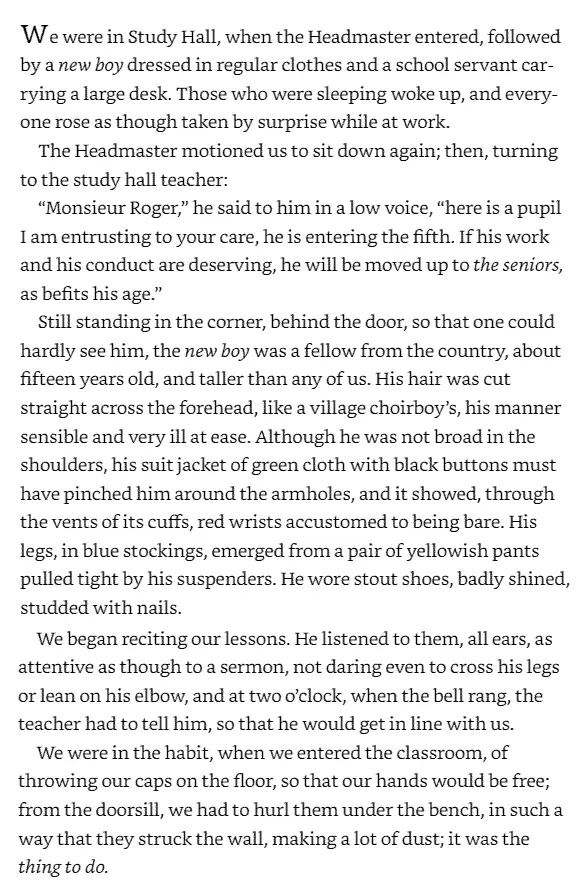
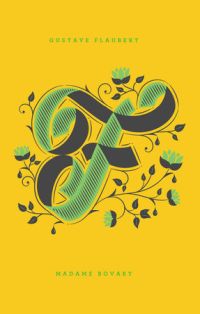
Get the Penguin Drop Caps Davis translation of Madame Bovary: Provincial Ways
Cover design by Jessica Hische.
Available as a hardcover (ISBN 9780143123804, 432 pages).
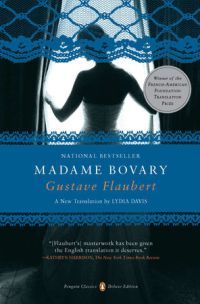
Get the Penguin Classics Deluxe Edition Davis translation of Madame Bovary: Provincial Ways
Includes an introduction and notes by Lydia Davis. Paperback with folding flaps and deckle-edged pages.
Available as a paperback (ISBN 9780143106494, 384 pages).
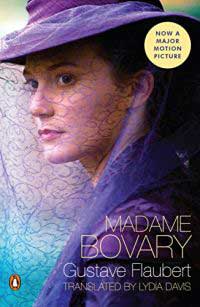
Get the Penguin Classics Deluxe Edition Davis translation of Madame Bovary: Provincial Ways
Includes an introduction and notes by Lydia Davis.
Available as an ebook (ISBN 9781101462430, 412 pages).
Who is Adam Thorpe?
He is a British writer of poetry, novels, short stories, translations, radio dramas, documentaries, reviews, news articles, journal articles, and magazine articles.
About the Thorpe translation of Madame Bovary
Thorpe, in the introduction to his 2011 edition: “The peculiar difficulties that Madame Bovary presents for the translator include the author’s fondness for the imperfect tense, varying levels of pastiche, and his habit of extending a certain lexical field (legal, military, etc.) through a whole paragraph; any translation has to be alert to changes of nuance and tone that are micrometrically calibrated, as well as the changing shades of irony, and attempt to find an equivalent for Flaubert’s verbal mimicry of wordless states or experiences.”
Guardian: “Madame Bovary: the Everest of translation” by Adam Thorpe
This is a fascinating article about the translator’s process. “Madame Bovary is perhaps the most carefully written book in literary history. It is the verbal equivalent of the Franck Muller Aeternitas Mega 4 wristwatch, with 36 complications and a 1,000-year calendar. The latter is totally unnecessary to the ordinary mortal, but then so is the exquisite music and mimicry of Flaubert’s language…. [I decided] I would stick to period language…. With an effort of the imagination we can think back to the past’s present, when it was fresh and frighteningly new to those who dwelt in it, and language can be the spell that gets us there…. I had to take an irony geiger count of every sentence – whose “right” translation lurked just around the corner. This was the version that combined accuracy, naturalness and musicality. The problem was the lack of corners: as in a dream, there would be one long traverse with nothing on it. The solution would appear (sometimes the novel felt like a vast crossword puzzle) through a combination of experiment, meditation and lateral thought: I had to step firmly away from the French and face a contrary direction – another track entirely. The solution usually had only two out of the three essential elements, and more work had to be done: less a path to climb than a Rubik’s Cube of words to be twisted about or thrown at the wall.”
The Longest Chapter: Review by Kassie Rose of The 100 Best Novels in Translation by Boyd Tonkin
“Tonkin does not recommend Lydia Davis for Madame Bovary, who’s widely considered to be among the best. Instead, he recommends Adam Thorpe. ‘Translation: Among recent versions, those by Lydia Davis and Geoffrey Wall both excel, but the novelist Adam Thorpe (2011) — who, brilliantly, employs only the English vocabulary of Flaubert’s time — achieves a flavour that approaches the dream-like strangeness of Flaubert’s hyper-realism.’ “
Extract from the Thorpe translation of Madame Bovary
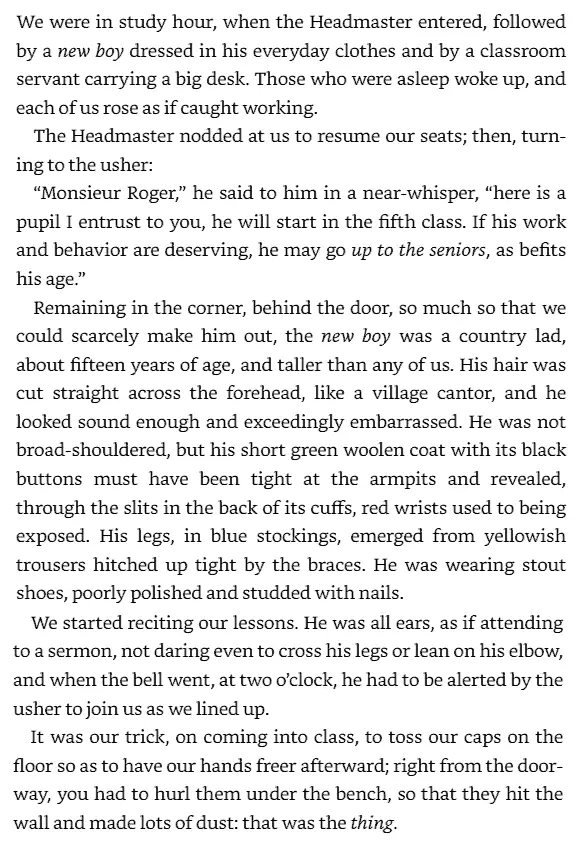

Get the Modern Library Classics Thorpe translation of Madame Bovary: Provincial Morals
Includes an introduction by Adam Thorpe.
Available as a paperback (ISBN 9780812985207, 464 pages).

Get the Modern Library Classics Thorpe translation of Madame Bovary: Provincial Morals
Includes an introduction by Adam Thorpe.
Available as an ebook (ISBN 9780812985214, 466 pages).
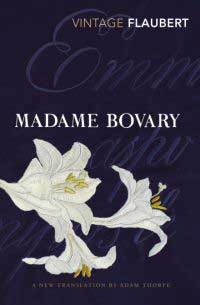
Get the Vintage Classics Thorpe translation of Madame Bovary: Provincial Morals
Includes an introduction by Adam Thorpe.
Available as a paperback (ISBN 9780099573074, 384 pages).
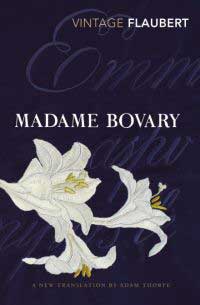
Get the Vintage Classics Thorpe translation of Madame Bovary: Provincial Morals
Includes an introduction by Adam Thorpe.
Available as an ebook (ISBN 9781448113927, 384 pages).
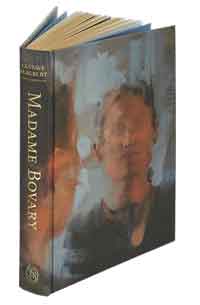
Get the Folio Society Thorpe translation of Madame Bovary: Provincial Morals
Luxury slicased hardcover with a foreword by Henry James, an introduciton by Karl Ove Knausgard and illustrations by Nushka. Gilded page edges, ribbon bookmark. Limited to 750 hand-numbered copies.
Available as a hardcover.
Emma Bovary, the Female Don Quixote
Flaubert deliberately chose to create a character whose mental state was disturbed by books just as Don Quixote was.
Books Are Our Superpower: “Don Quixote and Emma Bovary” by Walter Bowne
“Although the premise to each book is essentially the same, life imitating art, romantic art, and the tragic results of such an aim, each book upholds a different view of art for its main character, as well as a different view of romanticism…. Cervantes has a lighter, noble view of his hunted hero, while Flaubert has a darker, more sinister view of the world that surrounds his haunted heroine.”
The Millions: “Bad Romance: Madame Bovary, Translated by Lydia Davis” by Kevin Frazier
“Flaubert first read Don Quixote in 1832, when he was eleven years old, and he had heard tales from the book when he was even younger. By the time Madame Bovary was published, in 1857, he had already been thinking about Cervantes for at least a quarter of a century. Moreover, he had created in Emma Bovary a character who would renew and deepen the meaning of Don Quixote for the future. Emma embodies, in one person, the conflict between idealism and pragmatism that Cervantes divides between Don Quixote and Sancho Panza. The argument between the knight and the squire is Emma’s argument with herself: she touches both of their extremes at once, as well as many points in between those extremes.”
If you read Don Quixote, you can do some comparison and contrast yourself.
Other Fiction by Flaubert
Madame Bovary is the best-known of Flaubert’s novels, and also the first that he wrote. He is also the author of the following works of fiction:
1862 – Salammbô
1869 – Sentimental Education
1874 – The Temptation of Saint Anthony (a prose poem)
1877 – Three Tales: “A Simple Heart”, “Saint Julian the Hospitalier”, and “Hérodias”.
1881 – Bouvard and Pécuchet (unfinished)
Guides for Madame Bovary
Movie Adaptations of Madame Bovary
There have been many adaptations… there’s a book about them, called Madame Bovary at the Movies.
Books about or inspired by Madame Bovary
Below are listed a few related works that may be of interest.

Get The Perpetual Orgy: Flaubert and Madame Bovary by Mario Vargas Llosa
This is a book-length essay first published in 1975 by the Nobel Prize–winning Peruvian novelist Mario Vargas Llosa. It examines Flaubert's 1857 book Madame Bovary as the first modern novel. Translated from the Spanish by Helen Lane.
Available as a paperback (ISBN 9780374520625, 256 pages).

Get The Perpetual Orgy: Flaubert and Madame Bovary by Mario Vargas Llosa
This is a book-length essay first published in 1975 by the Nobel Prize–winning Peruvian novelist Mario Vargas Llosa. It examines Flaubert's 1857 book Madame Bovary as the first modern novel. Translated from the Spanish by Helen Lane.
Available as an ebook.

Get Flaubert and Madame Bovary by Francis Steegmuller
First published in 1939 and again in 1966. Now (in 2005) with an introduction by Victor Brombert. "Francis Steegmuller's beautifully executed double portrait of Madame Bovary and her maker is a remarkable and unusual biographical study, a sensitive and detailed account of how an unpromising young man turns himself into one of the world's greatest novelists."
Available as a paperback (ISBN 9781590171165, 384 pages).
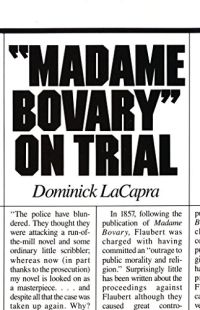
Get Madame Bovary on Trial by Dominick LaCapra
This is a work of literary criticism that examines how the novel Madame Bovary and the trial of Madame Bovary can be said to interact. It is legitimately a FREE ebook. It seems to have been released under a creative commons license rather than a copyright.
Available as an ebook.

Get Flaubert and Don Quixote by Soledad Fox
"This book tells the story of how Flaubert’s admiration for Cervantes’ Don Quijote unfolded, and how profoundly it shaped and influenced Flaubert’s ambition and his approach to all his major works, beginning with his breakthrough novel Madame Bovary."
Available as a hardcover (ISBN 9781845192570 ).

Get Flaubert and Don Quixote by Soledad Fox
"This book tells the story of how Flaubert’s admiration for Cervantes’ Don Quijote unfolded, and how profoundly it shaped and influenced Flaubert’s ambition and his approach to all his major works, beginning with his breakthrough novel Madame Bovary."
Available as a paperback (ISBN 9781845193973, 210 pages).

Get Charles Bovary, Country Doctor by Jean Amery
"Fans of Flaubert's Madame Bovary will want to read this reimagination of one of literature's most famous failures, Charles Bovary. Part fiction, part philosophy, Charles Bovary, Country Doctor is also a book about love."
Available as a paperback (ISBN 9781681372501, 176 pages).

Get Charles Bovary, Country Doctor by Jean Amery
"Fans of Flaubert's Madame Bovary will want to read this reimagination of one of literature's most famous failures, Charles Bovary. Part fiction, part philosophy, Charles Bovary, Country Doctor is also a book about love."
Available as an ebook.
What’s the best Madame Bovary translation?
If you want a classic translation, choose one of the Marx-Aveling editions.
If you want a British translation, choose Wall, or maybe try Thorpe.
If you want a loose American translation, choose Steegmuller.
If you want to read the trendy American translation, choose Davis.
… and remember, don’t read the introduction if you don’t want the ending spoiled. 😉

